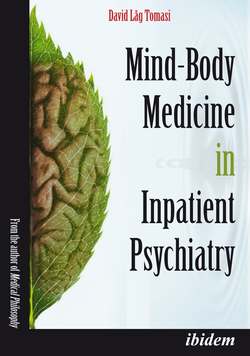Читать книгу Mind-Body Medicine in Inpatient Psychiatry - David Låg Tomasi - Страница 10
На сайте Литреса книга снята с продажи.
Needs and Objectives: a) Individual and Group Therapy Sessions:
ОглавлениеThe following terms are the descriptors used throughout this research study, as well as the exact terms utilized on the University of Vermont Inpatient Psychiatry Electronic Health Record (EHR) Epic/Prism software system.
Group Goals:
Developing Coping Skills; Identify Grief/Loss; Identify Feelings; Identify Stressors/Problems; Increase Activity Level; Increase Affective Range; Increase Attention Span; Increase Awareness of self in relation to others; Increase Education about Mental Illness; Increase Emotional Expression; Increase Expression of Needs; Increase Motivation; Increase Organization; Increase Relaxation; Increase Responsibility of Behavior; Increase Self-Control; Increase Self-Esteem; Increase Socialization.
Patient Communication:
Answered Questions; Circumstantial/Tangential; Delusional Speech; Latent; Logical; Loose; Pressured; Silent; Spontaneous verbalization.
Patient Behavior:
Ability to Complete Task; Angry behavior; Anxious Behavior; Appropriate; Attentive; Depressed Affect; Disorganized; Disoriented; Disruptive; Dozing off; Engaged; Inattentive; Initiation without Prompts; Intrusive; Labile affect; manic; Organized; Social Interactive; Withdrawn.
The extended list of groups offered on the Inpatient Psychiatry Psychotherapists/Group Therapists offered on the Inpatient psychiatry units Shepardson 3 and Shepardson 6 by the Psychotherapists/group therapists is as follows:
Affirmations & Gratitudes/Positive Affirmations
Anger Management
Art Therapy
Body Awareness
Coffee Talk
CBT—Cognitive Behavioral Therapy & Cognitive Processes
CFT—Compassion Focused Therapy
Coffee Talk
Communication Skills
Crossword Puzzle
DMT—Dance Movement Therapy
DBT—Dialectic Behavioral Therapy
Discharge & Post Crisis Plan
Daily Goals/Check-in
Distress Tolerance
Drumming/Relaxation
Effective Questions
Exercise/Gentle Movement
Eurhythmics
Focus
Games, including Board Games, Video vs. Computer Games
Garden
Gentle Yoga
Grief and Anger
Group Therapy
Journaling
Karaoke
Leisure Skills
Life Skills
Magnetic Expression
Meditation/Mindfulness/Relaxation
Mind and Body Connection
Morning Check-In
Movie Nights
Music & Movement
Narrative Medicine
Nutrition
Open Art/Arts & Crafts
REBT—Rational Emotive Behavior Therapy
Recovery Group (volunteer-based, discussed separately in Chapter 5)
Pathways (volunteer-based)
Personality Type
Pet Therapy (volunteer-based)
Poetry
Positive Affirmations
Relapse Prevention
Seeking Safety
Self-esteem
Self-image
Self-reflection
Solve That Problem
Spiritual Care
Stress Management
Supportive Relationships
T’ai Chi Chuan
VR-based therapeutic and leisure activities
